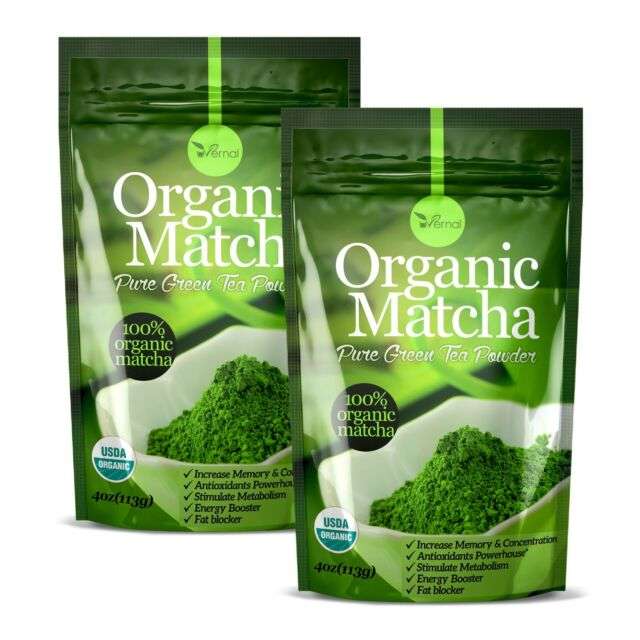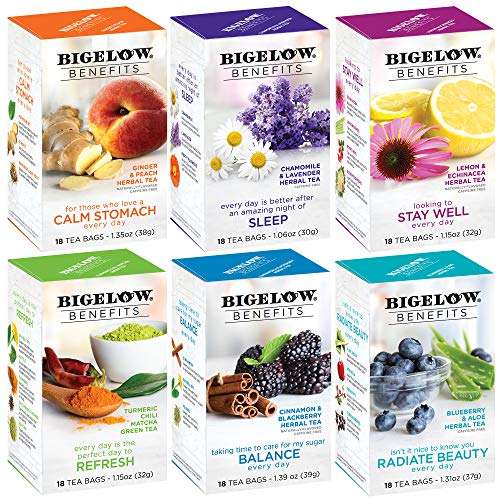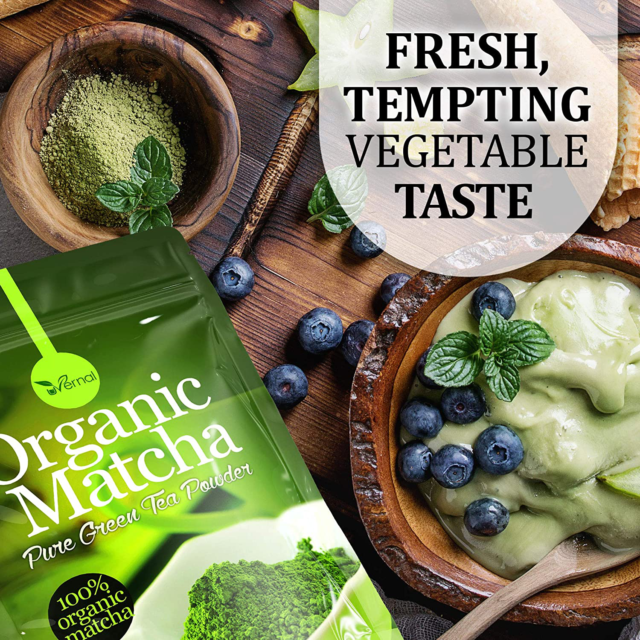Both Matcha And Green Tea Carry Nutrition And Health Benefits
Per the U.S. Department of Agriculture , 1 cup of green tea contains about 2 calories. The amount of calories in matcha may vary slightly by brand, but according to the USDA, matcha generally contains around 5 calories per serving. Both green tea and matcha are low-calorie drinks its only when you add milk, cream, sugar, sweeteners, and all of your other matcha latte favorites that the calorie count starts to creep up .
In general, tea drinkers may enjoy longer lives. Those who drink it regularly had a life expectancy that was 1.26 years longer compared with those who avoid the brew, likely due to the heart-healthy benefits of tea, according to a European Journal of Preventive Cardiology.
Green tea in particular is known as a healthy beverage, as it contains catechins, which offer antioxidant properties. According to an Molecules, the catechins in green tea can help protect against oxidative stress and its associated diseases. There are several catechins in green tea, but the most abundant one is epigallocatechin-3-gallate . It is this antioxidant that has been credited as giving green tea its health properties, which include anti-cancer and anti-inflammatory properties as well as cardiovascular protection, notes a review of research on the health benefits of green tea Beverages.
Everyday Health
Awesome Alternatives To Coffee
When I give up coffee, I still miss the occasional hot beverage throughout the morning. One of the more convenient aspects of a hot cup of black coffee is that theres no calories involved its basically a free drink. Remove it, and your list of calorie-free beverages drops by 25%.. Water, Tea, and Diet Soda .
Heres some AWESOME coffee replacements that Ive collected over the years. Ill cover each one By the way, some of these still have caffeine but in FAR less quantities than a solid cup of black.
Compared To Coke How Much Caffeine Is In Green Tea
An 8-ounce can or bottle of soda contains between 24 and 46 milligrams of caffeine, but soda is most commonly sold at supermarkets in 12 ounce bottles. According to the researchers at the University of Utah, a 12 ounce bottle of Coca-Cola Classic contains 34 milligrams of caffeine. This means that whether you’re drinking 8 ounces or 12, one drink of Coke would be roughly equivalent to an 8 ounce cup of green tea.
Recommended Reading: Is There Caffeine In Snapple
Are There Side Effects From Matcha Tea
Drinking green tea and matcha are considered healthy and safe, but people sensitive to caffeine should be aware that both contain decent amounts of the stimulant. In 2016, the World Health Organization also linked the consumption of hot drinks, like coffee and tea, to a higher risk of cancer of the esophagus. However, the risk is much lower than the risk of cancer from other causes, like smoking.
How Much Caffeine Is In A Cup Of Green Tea

The average amount of caffeine in an 8-oz serving of green tea is around 35 mg .
However, this can vary. The actual amount can be anywhere between 30 and 50 mg per 8-oz serving.
Since the caffeine in green tea occurs naturally, the amount depends largely on the variety of tea plant, its growing conditions and the way it is processed and brewed.
For example, tea made with older leaves usually has less caffeine than tea made with younger tea leaves .
The amount of caffeine in your drink can also be influenced by the type of green tea you choose and how you prepare it.
For example, bagged teas tend to be more caffeinated than loose leaf teas.
This may be because the tea leaves in tea bags are crushed up, so more caffeine is extracted and infused into the drink .
Additionally, powdered green teas like matcha have a higher caffeine content than both bagged and loose green tea.
Nevertheless, portion sizes tend to be small 1 gram or half a teaspoon per serving for powdered teas, so the caffeine content of the bagged tea and powdered matcha tea can be similar .
Finally, the longer you brew your tea and the hotter the water, the more caffeine will make its way into your drink .
Summary: An 8-ounce cup of green tea contains between 30 and 50 mg of caffeine. Powdered green tea like matcha contains more caffeine than loose leaf or green tea bags.
You May Like: Flatlander Signature Blend
Decaf Matcha: Energy Drink From Which Energy Was Removed
So, it doesnt make sense to remove caffeine after the extra effort was made to increase caffeine. It is like you made a refreshing shaved ice in a freezer and served it in a hot bowl to remove the chilling effect. Or, you swept fallen leaves from the backyard and dumped the leaves back in the yard.
In fact, the process of removing caffeine also removes L-theanine. Both caffeine and L-theanine are highly water-soluble. And increasing caffeine and L-theanine is the main purpose of the shading process.
How Much Caffeine Is In Matcha
For some people, the caffeine in matcha is a boon, making it an alternative to coffee on days theyre dragging. For those who are sensitive to caffeine, it may be a drawback.
So how does the drink stack up?
While matcha does have more caffeine than regular green tea, it generally has less than coffee, says Bannan. However, as with all teas and coffees, depending on how its brewed and how concentrated it is, the amount of caffeine can vary greatly.
Heres a quick look at how the caffeine content in a cup of matcha stacks up against other caffeinated beverages:
thehealthy.com
You May Like: Caffeine In Venti White Chocolate Mocha
Why Is There Caffeine In Decaf Tea
Allow us to start with why because, well, its in the name, right? Decaf Tea shouldnt have a single ounce of caffeine remaining otherwise it isnt living up to its promise. We understand the frustration.
However, the bottom line is that the Camellia sinensis plant is one of sixty plants to contain the stimulant, the same as Coffee and Yerba Mate .
Removing Caffeine in Tea and its counterparts requires further processing known as Decaffeination. There is no such thing, in other words, as a naturally occurring Decaf Tea or Coffee.
Weve talked about the four primary methods of Decaffeinating in another article. What we want to look into in this particular blog is, Does Decaf Tea have caffeine AFTER decaffeination?
While extracting caffeine has become increasingly efficient in recent years, it is all but impossible to remove 100% of the substance. Some residue will, inevitably, remain.
Try not to worry, though, as when we say residue, we mean it. If you consider yourself caffeine-sensitive or, perhaps, youre pregnant and hope to cut down your intake, brewing Decaf Tea is still a relatively safe option.
Exposure To Toxic Elements
This side effect stems from the environment that the camellia sinensis tea plant is grown in. Lead, arsenic and fluoride have all been identified in the soil where some of these tea plants grow, and these chemicals make their way into the green tea leaves themselves.
With regular brewed green tea, they pose less of a threat because only a very small amount infuses into the hot water. But utilizing the entire leaf to make matcha means consuming higher levels of potentially harmful substances.
Especially if you are consuming matcha daily, youll want to make sure youre choosing organic matcha that is also screened for these toxins and heavy metals.
Our Sun Goddess Matcha is Quadruple Toxin Screened to ensure purity:
You May Like: Where Can I Buy Grinds Coffee Pouches In Stores
Matcha Offers Health Benefits
Because matcha is made from high-quality tea, and the whole leaves are ingested, its a more potent source of nutrients than steeped green tea. In addition to providing small amounts of vitamins and minerals, matcha is rich in antioxidants called polyphenols, which have been tied to protection against heart disease and cancer, as well as better blood sugar regulation, blood pressure reduction, and anti-aging. Another polyphenol in matcha called EGCG has been shown in research to boost metabolism, and slow or halt the growth of cancer cells.
Compared To Other Tea How Much Caffeine Is In Green Tea
Green tea contains 20-35 milligrams of caffeine per eight ounces, depending on which type you choose and how long you allow it to brew. In terms of other tea varieties, green tea is a good middle ground in regards to caffeine content. Black tea and oolong tea generally contain more caffeine than green tea containing 25-45 milligrams. White tea has the lowest amount caffeine after green tea, with 10-30 milligrams of caffeine per eight ounces.
Don’t Miss: How Much Caffeine In Nespresso Voltesso
Lets Start At The Beginning
Green tea comes from the very same plant used to make black tea a leafy bush called Camellia Sinensis. Theres a slight difference between the two teas though the fermentation or oxidation process varies depending on whether black tea or green tea is being made. This process is much gentler when making green tea and the leaves are oxidised for a shorter time.
Does Green Tea Have Caffeine

It does! Green tea comes from exactly the same plant, the camellia sinensis, as all other âtrueâ teas â black, white and oolong, all of which contain the stimulant caffeine. Caffeine is a naturally occurring substance and can be found in around 60 plant species including tea, coffee and cocoa.
The exact amount of caffeine in different green tea blends depends on the types of leaves and which region they are from. Other factors, like brewing time and the amount of tea leaves used, can also affect the amount of caffeine in green tea.
Of course, caffeine is known for its energizing properties, so if youâre sensitive to caffeine later in the day, avoid caffeine-rich drinks before bedtime. You can find more tips on improving your sleep habits here.
Read Also: Is There Caffeine In Snapple
May Reduce Your Risk Of Heart Disease
Heart disease is the biggest cause of death worldwide. Many factors are known to increase heart disease risk .
Drinking green tea may help improve several of these risk factors, including total cholesterol, LDL cholesterol, triglycerides, and blood sugar levels (
24 ).
However, keep in mind that green tea is only a very small piece of the weight loss puzzle and not all studies agree that it helps.
A recent review concluded that the weight loss effects of green tea are so small that they are not of clinical importance .
Both Matcha And Green Tea Can Fit Into A Weight Loss Or Weight Management Plan
A review of randomized, controlled trials concluded that green tea induced a small, statistically nonsignificant weight loss in overweight or obese adults. In other words: It is unlikely to be the X factor in helping someone lose or maintain a weight loss.
There may be something to the idea that matcha could enhance weight loss, though. A small International Journal of Sport Nutrition and Exercise Metabolism found that when the 13 female participants consumed a matcha drink before a brisk walk, they had improved fat burning during that walk. Other research has suggested a link between EGCG and increased fat oxidation in men although this was a randomized, double-blind, placebo-controlled study, it involved only six people and took place over just two days.
Keep in mind that these are two very small, very short-term studies. More research is needed to prove any definite connection, and the researchers cautioned against overstating the metabolic effects of matcha and green tea.
RELATED: The Health Benefits and Risks of Green Tea for People With Type 2 Diabetes
You May Like: Grinds Coffee Pouches Discount Code
Matcha Is On The Trend
Matcha green tea has managed to gain a legion of faithful followers and an increasing number of people are constantly jumping on the bandwagon. One of the main appealing points about matcha lies in its ability to be treated as a substitute for coffee. While many people have made the conversion from coffee to matcha green tea, highlighted below are 9 vital points that are bound to convince the remaining critics to make the conversion.
Caffeine In Matcha Tea
Matcha is our favorite high-caffeine tea, hands-down.
A one-cup serving of matcha, made with a teaspoon of matcha powder, contains between 75-130 mg of caffeine and up to 130 mg of l-theanine .
To top things off, you drink the entire tea leaf in finely-ground form when you drink matcha. As opposed to other forms of tea that you steep and remove before drinking, that means youre ingesting 100% of the caffeine, theanine, and antioxidants in matcha.
Also Check: Is Coffee Good For Uric Acid
Why You Should Drink Decaf Tea
The biggest benefit of decaf tea is that you can consume it at any time of the day, even in large quantities, without worrying about getting the jitters or having insomnia. You don’t need to drink only decaf brews unless you have sensitivity to caffeine or another medical, religious or personal reason to take into account. You can mix it up with a decaf herbal blend before bed to help you sleep peacefully and a rejuvenating Darjeeling, Assam, Ceylon or white tea in the morning to jump start your day.
May Boost Relaxation And Alertness
In addition to being a great source of antioxidants, green tea contains a unique amino acid called L-theanine.
In fact, matcha boasts much higher levels of L-theanine than other types of green tea.
L-theanine may increase alpha waves in your brain. These waves are linked to mental relaxation and may help fight stress signals (
SUMMARY
Matcha is loaded with antioxidants and offers numerous health benefits, potentially reducing heart disease risk while aiding weight loss, relaxation, and alertness.
Read Also: Which Starbucks K-cup Has The Most Caffeine
Drinking Matcha Every Day: The Experience
According to Dr. Richard Firshein, D.O., the founder of Firshein Center, introducing caffeine into the body regularly can have varying effects. “The way we process caffeine is regulated by the frequency that we consume it, the type of beverage it is found in, our genetic predispositions and our gut biome,” he explains.”If someone isn’t used to , their body may not be used to it and they may have more severe side effects.”
Fortunately, for me, that was not the case, but I did notice a difference. The first day, I couldn’t believe how much energy I had. I honestly felt like I was bouncing off the walls. I’m a hardcore breakfast person, so in addition to my hearty meal, I had both a 16-ounce and 32-ounce matcha latte because I wasn’t sure how much I’d need to get through my workday.
Despite my heavy consumption, I was pleasantly surprised by the fact that I didn’t have the caffeine crash many coffee drinkers do in the middle of the day. According to Matchabar founders Graham and Max Fortgang that was because “the value proposition of matcha energy is entirely different from coffee or other teas.” They explain, “Matcha, unlike coffee or steeped tea, is created by grinding fresh tea leaves into a fine powder. By extension, when you drink matcha you are consuming the entire tea leaf in powder form.”
Drinking Matcha Every Day: The Recipe

The most important part in adding matcha to my daily routine involved perfecting my latte recipe. I like my matcha strong and not too sweet, but I love dairy so I’m usually not down with milk alternatives.
The ratio I settled on was two teaspoons of matcha powder per 16-ounce glass, with half of it filled with ice, and milk poured up to about three quarters of the glass. Most days, I indulged in a 32-ounce latte, so there were a total of four teaspoons of matcha powder in each drink. I sweetened the concoction with one Truvia packet per two teaspoons of matcha and dissolved it into the hot water while I was mixing up my team with an electric whisk.
Read Also: How To Clean My Mr Coffee Maker
Matcha Is Made So That It Offers More Caffeine
Have you wondered where you can find decaf Matcha? The reason its hard to find is the nature of Matcha. Once you know what really matcha is, you will understand decaf Matcha is the two contradictory ideas. Decaf Matcha is like rain on a sunny day, ice cream in a hot oven, or a warm blanket filled with ice. Why? Because Matcha is made to offer higher Caffeine. If you want to find a low caffeine green tea powder that offers amazing green tea benefits, please read on.
Will You Have A Caffeine Crash After Drinking Matcha
If one of your qualms with coffee is that you get a quick hit of energy only to come crashing down, well, consider yourself about to be even more intrigued by matcha.
Here’s the cool thing about it: Matcha contains an amino acid called l-theanine, which helps your body absorb the caffeine more slowly, says Gans.
That’s not to say experiencing a caffeine crash after chugging matcha isn’t possible, but “l-theanine is believed to have a calming effect in the body, Gans explains.
Still, it’s best to limit yourself to three to four cups of matcha per day so that you dont go over the Dietary Guidelines for Americans recommended limit of 400 milligrams of caffeine a day, Miyashita adds.
Read Also: Can I Drink Coffee After Wisdom Teeth Removal